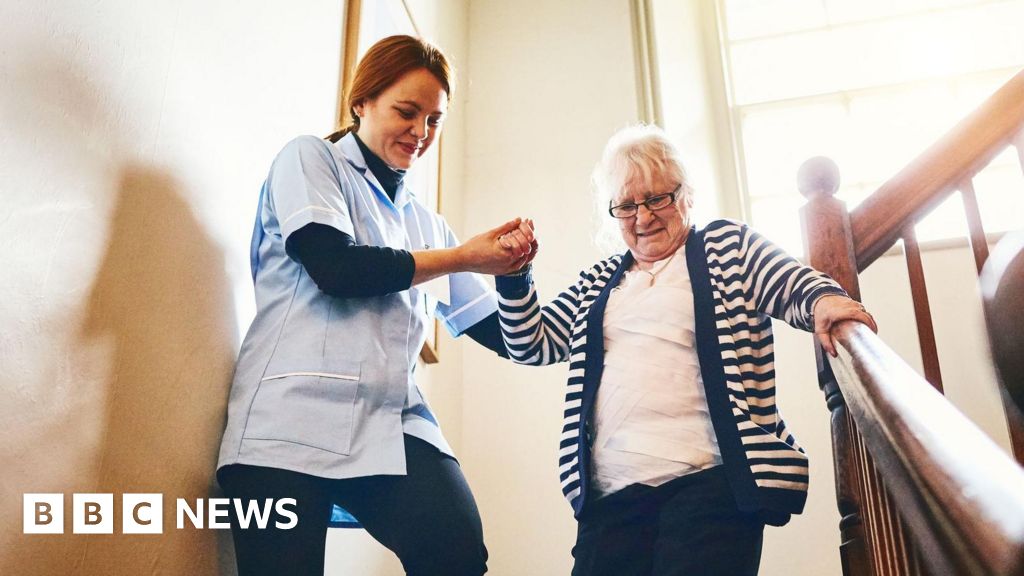ARTICLE AD BOX
By Christine Jeavans
Data journalist, BBC News
image source, Getty Images
Life expectancy for men in the UK has fallen for the first time in 40 years, according to Office for National Statistics (ONS) estimates.
Life expectancy at birth in the three years to 2020 was 79 years for men, falling back to a level last seen in 2012-14.
Female life expectancy was virtually unchanged, at just below 83.
Normally, life expectancy in the UK and around the world increases over time - and falls are rare.
But the Covid-19 pandemic saw life expectancy fall across most of Europe and the USA in 2020, on a scale not seen since the World War Two, according to research from Oxford University.
And experts say further reductions may be seen in the next year or so, before life expectancy starts to recover.
But what will happen in the longer term, as the effects of healthcare disruption become evident?
Death toll
Before Covid struck, life expectancy at birth in the UK was increasing, although at a much slower rate after 2011 compared with the preceding decades.
But the new figures show male life expectancy fell by seven weeks between 2015-17 and 2018-20 - the first such drop since current records began, in 1980.
Despite the name, these life expectancy figures, known as "period life expectancy", do not predict an actual lifespan.
Instead, they show the average age a newborn would live to if current death rates continued for their whole life.
And as Covid death rates are unlikely to continue long-term, the new estimates do not mean a boy born in 2020 will have a shorter life than one born in 2019.
But they do provide a snapshot of the effect of the pandemic that can be compared over time and between countries and different populations.
Looking at 2020 itself, rather than the three-year average, the ONS found life expectancy for men had fallen by 1.2 years and for women by 0.9, reflecting the higher Covid-19 death toll for men.
'Unprecedented impact'
The UK is far from alone in seeing these large drops in life expectancy for 2020.
An analysis of 29 countries across Europe, the US and Chile, shows falls in almost all of them, often reversing years of improvements.
And the US suffered the biggest decreases, with a fall of more than two years for men, according to researchers at the Leverhulme Centre for Demographic Science, at the University of Oxford.
The pandemic had a "very sizeable and unprecedented impact" on death rates and life expectancy, Dr Ridhi Kashyap, associate professor of social demography and one of the study's lead authors, says.
And losses of more than a year are particularly unusual
"This is something that we really don't have since World War Two for most of Western Europe - and since the dissolution of the Soviet Union, in the 1990s, in Eastern Europe," Dr Kashyap says.
And in many countries, life expectancy fell even below the 2015 figure, already a bad year due to a strong flu season.
Given the severity of the Covid-19 pandemic, a widespread fall is unsurprising, co-lead author Dr Jose Manuel Aburto says.
But, he says: "What is surprising is the magnitude of the fall."
The US was particularly hard hit as Covid death rates increased in the working-age population, rather than being limited to the older population, a pattern repeated in several Eastern European countries and to some extent in Scotland, Dr Aburto says.
But females in Finland and both sexes in Denmark and Norway showed slight improvements, while losses were small in countries such as Estonia and Iceland.
Survivorship effect
Once the pandemic is over and "its consequences for future mortality are known, it is possible that life expectancy will return to an improving trend in the future", ONS statistician Pamela Cobb says.
And there may even be a bounceback in the first year or so after it ends, due to what demographers call the "survivorship effect".
"Essentially what this means is you've lost a large section of your more frail population, then you have a healthier surviving population and you would expect mathematically there to be fewer deaths in the period that follows," Stuart McDonald, co-founder of the Covid-19 Actuaries Response Group, says.
But thinking about the long-term picture, there are a "whole range of factors that we are trying to understand".
'Slower growth'
Future waves of the virus, long Covid, economic disruption and delays to treatment for cancer and other serious illnesses all have the potential to keep UK life expectancy down, he says.
On the other hand, vaccinations, improved knowledge of mass-infection control and an increased focus on healthcare may help it recover.
"Does life expectancy get back on to its original track and continue increasing or does it increase from the lower point? I'm going to hedge, I think it's a bit of both," Mr McDonald says
"But my view, and the emerging consensus in the actuarial profession is that, even on a long-term basis, this is a net negative, meaning slower growth."
Quantifying impacts of the Covid-19 pandemic through life expectancy losses: a population-level study of 29 countries will be published in the International Journal of Epidemiology. The data is available for exploration here.

 3 years ago
84
3 years ago
84








 English (US) ·
English (US) ·